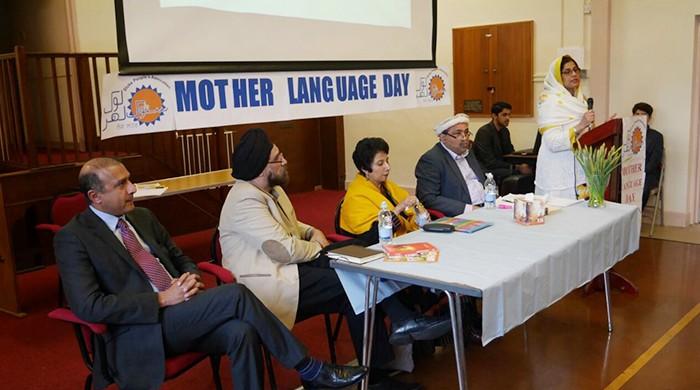Soulful poetry and Sufi kalaams — Asian diaspora celebrates International Mother Language Day in UK
February 22, 2017

STOKE: For the first time in Stoke, UK, a unique event was held to celebrate the International Mother Language Day. Over a 100 people of diverse backgrounds gathered to talk about the importance of regional languages, and were delighted by an educational and entertaining feast including speakers, poets and singers.
The event was organised by the Stoke People’s Association, the UK branch of Punjab Lok Lehar, under the stewardship of Waqas Butt.
The focus of the event was on the need for Punjabi to be taught as a mother tongue in schools in West Punjab and in the Asian diasporas in the UK. Speakers made heartfelt speeches about the emotional connection with their mother languages, emphasising on the need to give languages due status and importance to ensure their preservation.
The event was opened by Malik Waseem Abbas, who sang a folk song which went straight to the hearts of the audience. Poetry recitals by Asif Hashmi and Nugmana Kanwal illustrated how vibrant Punjabi remains as a language to convey complex and deep emotions. S. Balwant added to this by offering a number of poems from East Punjab. The diverse family of languages that is present in the North of the subcontinent was well presented by Shams Rehman who described his own personal journey in relation to Pahari and its connection with Potohari, Punjabi and Saraiki.
The speakers Hashim Farraj and Semer Kibreab gave the example of the Kurdish language and Tigrinya, respectively, saying neglecting and suppressing specific languages and cultures can result in the languages dying out with time.
Perhaps the highlight of the event was everyone speaking in their mother tongues despite the audience being diverse and speaking different languages. However, PowerPoint presentations in English ensured everyone understood what's being said.
The event saw no divisions in terms of national, religious or gender boundaries. There were poets and speakers from East and West Punjab. What was most refreshing about this gathering was the presence of an audience that was as diverse as it could be. Young and old, women and speakers from various countries made the event worth attending.
Alongside the poetry, the participants also spoke about how the International Mother Tongue Day started off as an annual event sponsored by UNESCO since 1999. Professor Virinder S. Kalra of Warwick University also enlightened the audience about the situation of minority languages in the UK and the need to promote these in schools and other educational establishments. Sameena Yasmin talked about her experience as a teacher of community languages in Stoke. Her main concern was that parents considered multilingualism a hurdle in the intellectual growth of children, while the opposite is true.
For many in the audience, the highlight of the event was a performance by well-known TV singing star, Lala Qadeer, who entertained the crowd with his renditions of Sufi kalaam. The traditional offering of food and tea made the event complete, as it's an essential and fitting end to a celebration of Punjabi culture and hospitality.
The event was closed with an impassioned speech by Nuzahat Abbas who gave the audience the scientific background to the importance of mother language in the development of children. Nuzahat's speech was enhanced by her insightful poetry, short story telling and touching voice. She gave the crowd a rousing end by singing Sultan Bahu’s Alif Allah.





